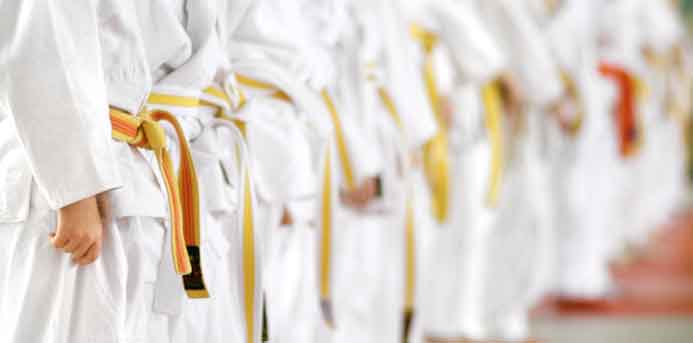It’s inevitable. Now that Jackie Chan’s lavish remake of the The Karate Kid has crane-kicked its way into theaters, you can rest assured that a well-lawyered petition to join the local dojo.
“But Mom, Bobby’s sensei said it helps with balance and concentration”—is hovering somewhere in your future.
We recommend you hold out for a worthwhile plea bargain—perhaps broccoli and brushing twice a day?—and then consider taking the deal, especially since long-standing research has shown that a trip to the dojo can aid in improving flexibility, stamina, concentration and posture.
And new evidence indicates that the martial arts are especially beneficial to youngsters with physical disabilities as well as conditions like ADHD, autism and Asperger Syndrome.
Researchers like John Ratey, a clinical associate professor of psychiatry at Harvard Medical School who devoted a chapter in his book, “Spark: The Revolutionary New Science of Exercise and the Brain“, to the idea, have found that the complex series of steps used in martial arts not only help children with ADHD stay focused but also increase levels of norepinephrine, a key neurotransmitter that helps reduces fidgeting and emotional outbursts.
It’s a phenomenon that Jeff Kohn, founder of the North Shore Dojo in Glenview, has seen in practice for over a quarter of a century. Kohn, a sixth-degree black belt who was named Chairman of the USA Karate Disabled Program by the United States Olympic Committee in February, has developed a special karate program for disabled students, including bilateral amputees and the blind.
“I use a tough-love approach,” says Kohn, whose non-for-profitKarate Can-Do increases awareness of the benefits of martial arts for the disabled. “I don’t allow them to say the word, ‘can’t.’ I physically move them through the movements, but we have different strategies to maintain focus and aid movement. When it works, it’s humbling to watch.”
Richard Baron of Little Nine Heaven Internal Kung Fu and Tai Chi School in Highland Park offers private in-home classes and has found that the martial arts provide kids with a healthy obsession to focus on, while John Fonseca of Fonseca Martial Arts integrates traditional and disabled students to emphasize teamwork and cooperation.
But in the end, the most telling evidence may come from the parents of children with disabilities, like Highland Park mom Betsy Brint who credits Jeff Kohn with helping her blind son, Alan, develop spatial orientation and coordination.
“It’s been really wonderful for Alan to do this,” she says. “You can see the sense of accomplishment and pride bubble up in him. It’s something that his brother and sister never did. So it’s been great for Alan to say to his brother, ‘You make be a great tennis player, but I’m a brown belt.’
Below is a list of local martial arts academies. Each offers different programs. (Please note, while the dojos mentioned above specialize in working with children with disabilities, the others listed here are more traditional but some offer specific programs.)
North Shore Dojo
Glenview
Traditional Karate Center
Wilmette
Fonseca Martial Arts
Evanston & Wilmette
Midwest Shotokan Karate (Note: Presently, they don’t have the manpower to take children with disabilities but is open to traditional students)
Mt. Prospect
Illinois Shotokan Karate Club
Palatine
Little Nine Heaven Internal Kung Fu and Tai Chi School Chicago
Highland Park
White Tiger (Tae Kwon Do)
Wheeling
Yong In Martial Arts (Tae Kwon Do)
Lake Bluff

